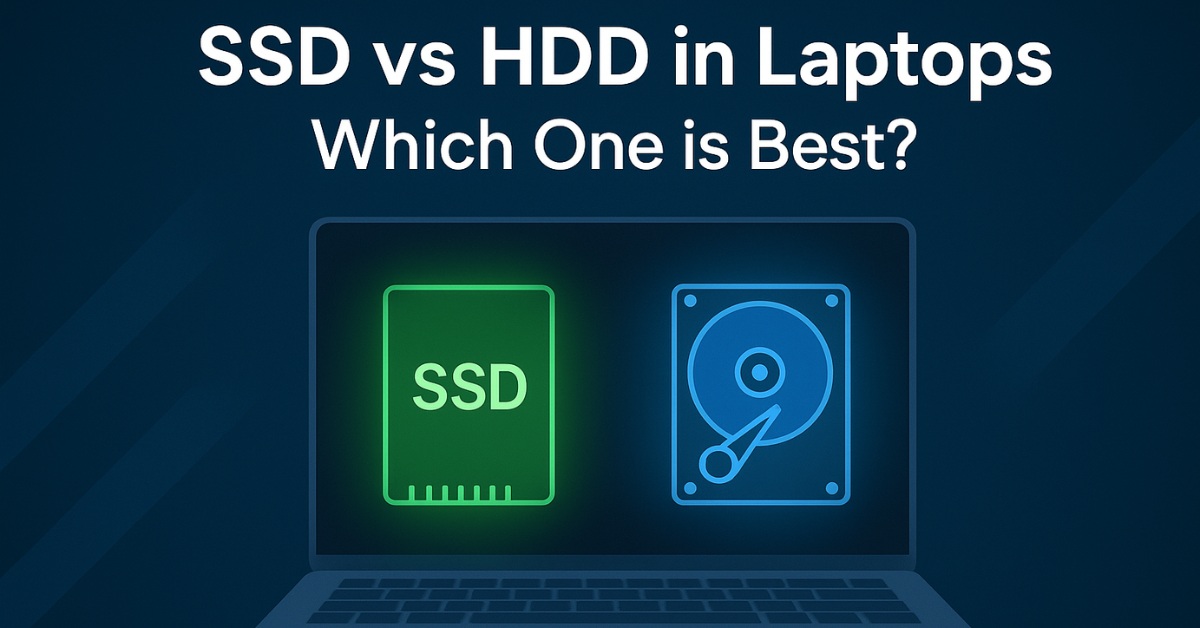Today’s topic is SSD vs HDD in Laptops. Let’s start. When I bought my first laptop a few years ago, I was completely overwhelmed by the storage options. Should I go for an SSD, which everyone said was fast but expensive, or stick with a HDD, the traditional hard drive everyone knew? After trying both, I finally understand why this choice matters more than most people think.
In this post, I’ll break down the differences between SSD and HDD, their pros and cons, and help you decide which is the best choice for your laptop.
SSD vs HDD in Laptops: The Basics
| Feature | SSD (Solid State Drive) | HDD (Hard Disk Drive) |
|---|---|---|
| Speed | Extremely fast, boots in seconds | Slower, may take minutes to boot |
| Durability | No moving parts, shock-resistant | Has moving parts, fragile |
| Noise | Silent | Produces noise due to spinning disks |
| Price per GB | Expensive | Cheaper |
| Storage Capacity | Usually 256GB – 2TB | Up to 5TB or more |
| Power Consumption | Low | High |
Personal Note: I switched from HDD to SSD, and the difference was like night and day. My laptop boots in just 10 seconds, and launching apps feels instantaneous.
Key Points to Consider in SSD vs HDD in Laptops
- Speed is King: SSDs dramatically improve laptop performance. If you’re tired of waiting for your laptop to boot or apps to load, an SSD is worth every penny.
- Budget Matters: HDDs are still unbeatable if you need a lot of storage for a low price. Perfect for storing movies, games, or backups.
- Durability: If you carry your laptop everywhere, an SSD is safer because it can handle shocks and accidental drops better than an HDD.
- Noise and Heat: SSDs are silent and generate less heat, while HDDs can be noisy and warm up over time.
When to Choose SSD
- You want fast boot times and snappy performance.
- You do video editing, gaming, or programming.
- You travel frequently and need a durable, reliable laptop.
When to Choose HDD
- You need large storage on a budget.
- Your laptop is mainly for media consumption, like movies and music.
- You don’t mind slower performance for everyday tasks.
My Recommendation
If your budget allows, go for an SSD—even a small 256GB SSD will make your laptop feel brand new. If you need massive storage, consider a hybrid setup: SSD for OS and apps, HDD for media files.
Tip: Many laptops now come with M.2 NVMe SSDs, which are even faster than regular SSDs. It’s a game-changer.
FAQ: SSD vs HDD in Laptops
Q1: Can I upgrade my laptop from HDD to SSD later?
Yes! Most laptops allow you to replace the HDD with an SSD. You may need a screwdriver and a bit of patience, or get it done at a service center.
Q2: Is SSD worth the extra cost?
Absolutely. The speed and durability improvements make everyday computing much smoother.
Q3: What is a hybrid laptop storage?
A hybrid setup combines SSD and HDD, giving you the best of both worlds: fast boot times and large storage capacity.
Q4: Will my laptop battery last longer with an SSD?
Yes, SSDs consume less power than HDDs, so your battery life can improve slightly.
Final Thoughts:
I’ve tried both, and while HDDs still have their place, SSDs are the future of laptops. Whether you’re a student, gamer, or professional, upgrading to an SSD will dramatically improve your computing experience. If you have any questions about this topic, SSD vs HDD in Laptops then ask me in the comments box.
Latest Post
- Windows 11 ISO 64 Bit Download – Official Direct Link
- How to Choose a Laptop in 2026: Honest Step-by-Step Guide
- BSOD Error: What Is Blue Screen of Death and How to Fix It?
- Rufus Software: What It Is, How It Works & Why You Should Use It
- Shortcut Key for Screen Recording in Windows 10 (Complete Guide)
![]()
